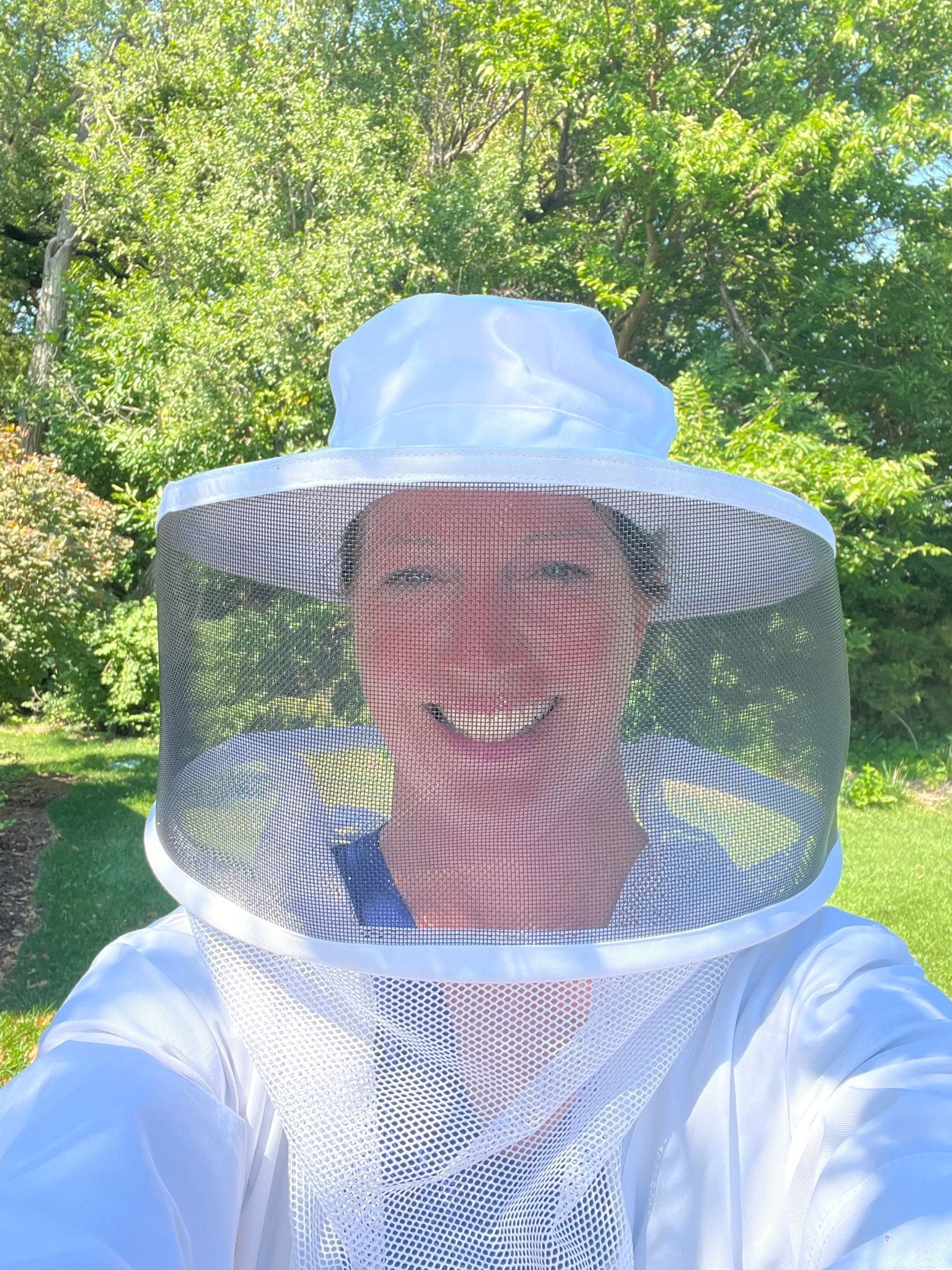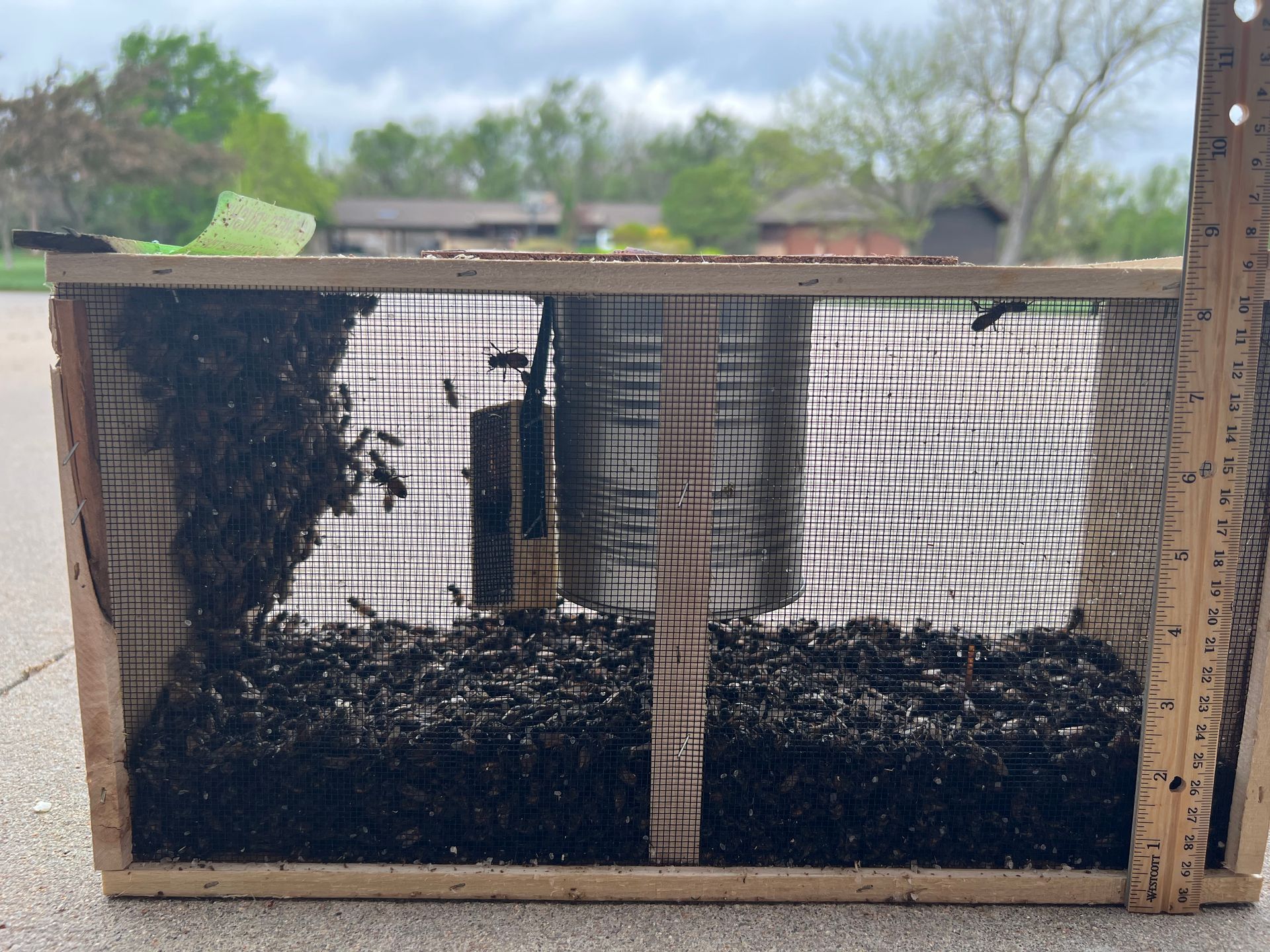Queen Beekeeper

Andover resident Michelle Knight dons her beekeeping garb.

A package of bees that the Knight had shipped through the postal service.

Honey after harvest is ready to be strained before bottling.

Michelle Knight cuts honeycomb into squares. The silver container is the extractor for harvesting liquid honey.
Bees had long been on the radar of Michelle Knight. Though her grandfather had kept bees, his passing when she was 2 years old denied her the opportunity to see his operation. So when her family moved from Atlanta to Wichita in 2018 and purchased acreage suitable to the task, the wife and mother of three decided it was time to give her ambitious endeavor wings.
Knight recently completed this year's honey harvest, which happens to coincide with September's National Honey Month. Its purpose it to promote national beekeeping, the beekeeping industry and honey as a natural and beneficial sweetener.
As the proud owner of three hives, Knight now understands what all the buzz was about. The hives have become an integral part of her small hobby farm, pollinating her sizable garden while co-existing alongside a modest brood of chickens.
“I’ve always had a general interest in the farm-to-table food experiences,” Knight said. “I’d always been interested in honey bees, so after we moved, I started looking into it and decided to start a couple hives.
“I love their connection to nature and their importance to the environment. It has always fascinated me how the whole hive works together to survive. They are one of nature’s great wonders.”
Knight launched her small-scale operation in 2019 with big hopes but no experience. What little she knew was gleaned primarily from self-help books and online tutorials. Her startup option of choice was to purchase a pair of nucleus hives, which included a mated queen with bees already housed in hives containing four to five frames. Each frame serves a particular purpose, providing storage spaces for the queen to bear and store her eggs and for worker bees to store honey pollen. Other start-up options included buying the bees and queen package separately and shaking them gently into their new home, or setting out swarm traps to attract migrant bees that have outgrown their former hive habitat.
Knight’s three hives house thousands of bees, which produce between one to four gallons of honey annually, along with wax she uses to make soap, candles and lip balm. The bees produce the honey from spring through fall, which Knight harvests between late summer and early fall. Larger operations may harvest more than once during a season, though rotations and months vary from keeper to keeper.
The typical lifespan of a bee is just three weeks during summer months, whereas bees hibernating in the winter survive four to five months. With so much to do and so little time to do it, a bee’s life is a busy one.
“They go through different jobs throughout their lives,” Knight said. “They may be an attendant or nurse queen at first, then graduate to janitor bee and clean out the hive, removing dead bees. Guard bees will sting you if you get too close to the hive, and worker bees build the honeycomb and store the pollen.”
To sustain the bees during the winter, beekeepers must be careful not to overharvest their honey supply, which bees subsist upon during winter months. Though condensed sugar water fondant may be used to supplement or replace a depleted honey supply, Knight said the mix can have a negative impact on the taste and texture of the new honey produced by the bees.
“It will help them survive through the winter, but it’s not the best honey to harvest if it is made from sugar water,” she said. “Taking too much honey from them can starve the bees. They live on what they have. I try to harvest in late summer to early fall so they have time to make more honey going into winter.”
Honey harvested by Knight is purified using a hand cranked metal extractor that filters the honey through a mesh strainer and cheese cloth to extract impurities such as small hive beetles, varroa mites and dead bees. Collecting the honey can be a tricky proposition, as bees don’t take kindly to strangers extracting honey from their hives. And though she wears a beekeeping suit for protection, stings remain an ongoing threat when harvesting honey.
“My first time I did it, I had panic moments with the bees swarming around my head,” she said. “When I realized, ‘I can actually do this,’ I took a few deep breaths and was fine. You really can’t be allergic to them because you are going to get stung every now and then.”
Caring for bees can be difficult and challenging, with time management being perhaps the greatest challenge for keepers. Opening the hives every few weeks during summer months to monitor honey output can be time consuming and dangerous, depending on the aggressiveness of the hives’ occupants.
Clearly, beekeeping is not for everyone. But to Knight and those willing to do what it takes to maintain their operations, it can be a rewarding and fascinating journey from one season to the next. Perhaps the only certainty in beekeeping is that there are many opinions circulating on just how best to handle them. For as long as beekeeping has existed, there are few absolutes beyond “handle with care” that are universally accepted by keepers.
“One thing you’ll see in forums is that if you ask 10 beekeepers a question, you’re going to get 10 different answers,” Knight said. “People have been doing it differently for hundreds and hundreds of years.”
Though she has no aspirations of growing her beekeeping operation beyond its hobby farm status anytime soon, Knight continues to educate herself on bee behavior through online beekeeper forums and reading materials. She now seeks out local beekeepers whenever possible when questions arise, hoping to make herself the best steward she can be to those she cares for on her acreage.
“There’s nothing like the hands-on experience from someone who can take you through the hive,” she said.“Great Plains Beekeepers has great resources. I’ve learned a ton reading “Beekeeping for Dummies” and the ”Beekeeping Bible.”
“Keeping bees is a lot of work. ‘Busy bees’ is an honest term. They never stop.”
